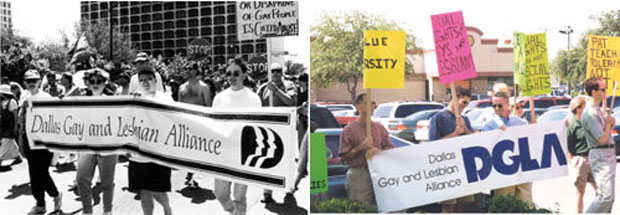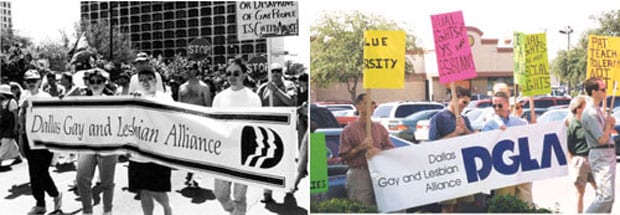
DEMONSTRATIONS | Dallas Gay and Lesbian Alliance takes to the streets when negotiating fails. Members marched in Austin for hate crime legislation in 1995, above, and protested Pat Buchanan’s appearance at Border’s Books in Dallas in 2002, below. (File photos)
When you think of gay activism in the early days of the movement, that one inescapable name is Dallas Gay Alliance. Founded in 1977, its mission was, from the start, to present a formal face of the gay community to media and before city council, to address issues such as police harassment and to talk to candidates running for office.
A few years after its founding, the Dallas Gay Political Caucus split off to become a political action committee that screened candidates running for office. The two groups remained separate for several decades, then remerged in the early 2000s.
DGLA (the L was added in 1992) has always been good at creating — and spinning off — other groups. In 1985, it created the AIDS Food Pantry and the AIDS Resource Center under the nonprofit name the Foundation for Human Understanding. By 1993, the groups severed ties when Resource Center had far outgrown its parent organization and the missions of the two groups had parted.
At the time, DGLA, along with the AIDS Resource Center, were the only groups in the state advising against taking an HIV test, then known as HTLV-III/LAV. The test wasn’t confidential at the time and the fear was reprisal by employers, insurance companies and the government. Within a year of DGA’s protest, the test became confidential in Texas.
Equality Texas, originally known as Lesbian/Gay Rights Lobby of Texas, was founded by five groups from around the state including DGLA.
When radio station KNON went on the air in 1983, the station manager contacted DGA to offer the group an hour a week to do a gay show. That show, Lambda Weekly, is still on the air after more than 30 years.
When talks with Parkland Memorial Hospital and Dallas County officials about AIDS care at the hospital didn’t bring results, DGA created GUTS (Gay Urban Truth Squad, which predated ACT UP) to begin street protests at city hall and in front of the hospital. DGLA promised to call off the rowdy protesters when the hospital agreed to better care for AIDS patients. Of course, the ragtag protesters marching and waving fists outside and the buttoned-down negotiators in suit-and-tie inside the halls were the same people.
When the only theater company in Oak Lawn was Dallas Theater Center, and that organization had no idea there were gay people in the neighborhood who might enjoy theater, DGLA created Theater Gemini, which performed in the back of its office on Cedar Springs Road. More recently, DGLA spawned Collin County Gay and Lesbian Alliance, now GALA North Texas, which created GALA Youth, a North Texas LGBT youth group.
DGLA’s first office was in the Esquire Theater on Oak Lawn Avenue. When that landmark was torn down to make way for an office that was never built (Eatzi’s stands on the property today), DGLA moved to Cedar Springs Road. Arson destroyed the office and much of the block in 1989.
When the Foundation for Human Understanding bought the old MCC church on Reagan Street soon after the fire, DGLA moved with them.
Today, the organization continues to do advocacy work and remains a strong voice for the LGBT community at City Hall.
This article appeared in the Dallas Voice print edition May 16, 2014.

